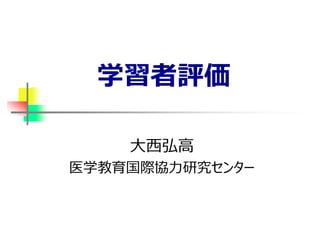
05 学習者評価
- 2. 導入 今までに受けた中で,悪い意味で印象に 残っている評価(試験,テスト)を思い 浮かべてみてください 理不尽に不合格にされた そもそも教育がしっかりしていなかった 脅迫的で,緊張を強いる評価だった
- 3. 評価の重要性 Assessment drives learning (Miller) 評価は学習を導く 例)韓国では,医師国家試験に2009年から実技評価を 採り入れた.不合格者が3%程度出て,裁判沙汰にも なるなどの社会現象を引き起こす一方,シミュレーション 教育が非常に盛んになった.ただ診療参加型臨床実習 (クラークシップ)を推進したかった教育関係者の中には むしろ後退したと苦言を呈する者もいた
- 5. 評価と評定 評価 目標と比較し,フィードバックを提供 評定 評価をレベル分けや点数に結び付け,合否を 判定可能な形にする 学習者は最終的には評定を気にするが,そこに 至る学習プロセスには評価全体が重要
- 6. 評価の種類:対象範囲 学習者評価(assessment) 本日の主題.これだけでもなかなか難しい ミクロレベル,学習者個人のレベルの議論と学 習者全体のレベルの議論 カリキュラム評価(evaluation) 日本語は同じ“評価”なので,混同しやすい マクロレベル,学習者全体を越えて包括的なレ ベルでの議論になる
- 7. 評価の種類:時期・目的 形成的評価 (formative) 総括的評価 (summative) カリキュラムに おける時期 カリキュラムの途中 カリキュラムの終わり 主目的 改善点を示す, フィードバックする 評定をし,合否判定 などの決断につなげる 信頼性 必要性低い 必要性高い
- 8. データ:量的か質的か 量的データ 質的データ 客観性 一見高い 低い 学習者間の比較 容易 困難 情報量 少ない 多い
- 9. 情報の圧縮 Q: 講義に満足しましたか. 1) 非常に満足 2) 満足 3) 少し満足 4) 不満 肺炎の起炎菌 S. pneumoniae - most common H. influenzae K. pneumoniae 1)です.彼女の講義はよくまとまってい て,分かりやすいです. 2)です.分かりやすい講義でしたが, 時に単純過ぎました. 3)です.講義ノートはいいですが, あの作り笑顔が嫌いなので. 4)です.彼女の洋服,あまりに イケてないんだもの
- 10. カリキュラム開発 6-step Approach (Kern) 1. 問題の定式化と全般的ニーズ アセスメント(医療・公衆衛生) 2. 対象学習者の ニーズアセスメント 3. 教育目標 (一般目標と 個別目標) 4. 教育方略(内容+方法) 5. 実施(人・物・金・ 時間のリソース, 組織内政治・・・) 6. 学習者評価と プログラム評価 ● ● ● ● ● ●
- 11. 評価のあるべき姿 教育目標,各学生の学習,評価は一貫性 を持ったものでなければならない 評価は学生を動機づけるものであるべき 信頼性,妥当性に優れたものであるべき
- 12. 個別学習目標の記載 SMART Specific – 対象が特定しやすい Measurable – 測定可能 Appropriate – 適切(色んな意味で) Realistic – 現実的(教員・学生に無理がない) Time-bound – 時間経過を特定した
- 13. 教育目標分類と評価 知識(認知領域) 想起,解釈,問題解決などのレベル スキル(精神運動領域) 態度(情意領域) スキルがあっても行動が変わるとは限らないが, スキルに態度変容が加われば行動が変容する
- 14. 教育目標分類はなぜ有用か 知識>スキル>深い知識,態度,という 評価のバランスになってしまいがちなことが 分かりやすくなる 認知領域において,知識は問題解決の 必要条件だが十分条件ではない
- 16. 例)医師国家試験 免許授与の可否を問う試験 浅い知識のみが問われる(全てMCQ) 合否判定は試験作成者が決定 世界的には医師国家試験を行う国は少数 問題点 態度,スキル,深い理解は問われない 大学別合格率が大学評価に利用される?
- 17. 様々な評価法(主なもののみ) 教育目標 評価手法 知識 MCQ,短答記述式 深い理解 口頭試問,小論文 スキル OSCE,実地観察 態度 評価表,ポートフォリオ
- 18. 臨床評価の真正性レベル Knows Knows How Shows How Does 知識に基づく評価 筆記試験やCBTなど (Miller GE. Acad Med 1990; 65: S63-7.) 臨 床 評 価 の 真 正 性 行動・パフォーマンスに基づく評価 技能・コンピテンシーに基づく評価 現場での業務能力・態度も関係 シミュレーション可能な技能 机の前で勉強して 点数がとれるもの
- 19. OSCE Shows howの評価 利点 ステーション数増やせば信頼性高い 様々なスキルを評価可能 欠点 OSCEの評価項目に合わせて実際の利用を考 慮しない学習が惹起される可能性 総括的評価の場合など極度の緊張生じる
- 20. 態度領域の評価 基盤となる知識についてはテストも可能 態度そのものについては形成評価(フィードバ ック)を重視する.総括評価(合否判定)は むしろパフォーマンス評価で行うべきか 総括評価は良い学習をもたらさないことも 何らかの行動として表れたのであれば,その 行動自体を評価・フィードバックする 「最近よく文献調べて診療しているようだね」
- 21. 業務に基づく評価 (work-based assessment) Does,パフォーマンスの評価が可能 Mini-CEX(mini clinical evaluation exercise): 外来での実患者の診察に対する概略評価 DOPS(direct observation of procedural skills): 目の前でのスキルの実演をチェックリストで評価
- 22. High-Stake Test 合否が修了認定に関わり,社会的に大きく 影響するような試験 合否判定に関し,信頼性が問題となる 内的一貫性:問題・課題の数,一元性etc 評価者間信頼性:客観試験でない場合,評価 観点の標準化,評価者トレーニング,評価表の 構成などが問題に
- 23. 内容 試験のブループリント,領域に対する項目の代表性,達成領域に 対するテスト内容の論理的/経験的な関連性 処理 プロセス 学習者によるテストフォーマットへの慣れ,スコアや評価の正確性, 部分点の分析 内的構造 項目分析データ:項目の難易度と識別係数など, 他の変数と の関係 収束的相関,弁別的相関,エビデンスの一般化可能性 結果 テスト結果が学習者や社会に与える影響, 妥当性に関わる情報 (Downing. Med Educ 2003;37:830を改編) 信頼性は妥当性に関わる情報の一つ 測定の標準誤差,一般化可能性分析 合否基準スコア決定 方法の妥当性,合否結果:決定の信頼性と分類の正確さなど 項目の信頼性,
